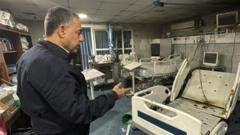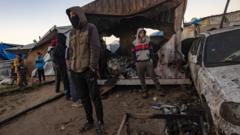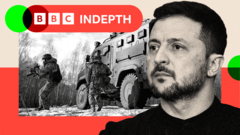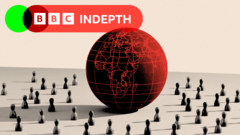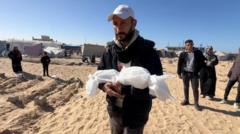As the war in Gaza continues, UNICEF's efforts to reunite children with families are hampered by violence and dislocation. The Masri family’s traumatic experience reflects a broader crisis, with thousands of children left without guardians amidst mounting casualties and chaos.**
Reuniting War-Torn Families in Gaza: A Harrowing Journey of Resilience**
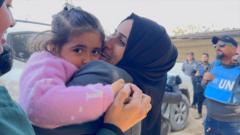
Reuniting War-Torn Families in Gaza: A Harrowing Journey of Resilience**
Amidst the ongoing conflict in Gaza, families grappling with loss and separation face immense challenges in reuniting their children. The story of the Masri family highlights the emotional and physical toll of war.**
The devastating impacts of the war in Gaza extend deeply into the fabric of family life, particularly for children like those in the Masri family. The tragedy of losing parents in an Israeli airstrike has left young Jamal and his cousins, Maria, Jana, and Zeina, grappling with the realities of separation and loss. Kawther al-Masri, their surviving grandmother, reflects on the perilous journey to bring them back home after the initial devastation.
Just six weeks ago, the children were rescued from the ruins of their home in Beit Lahia, having lost not only their parents but two cousins as well. The psychological scars are immense, with UNICEF reporting over 14,500 children killed in the ongoing conflict, alongside thousands more injured and an estimated 17,000 either unaccompanied or separated from guardians. With the level of chaos prevailing in Gaza, many of these children remain unidentified.
In a recent reunion filled with mixed emotions—joy overshadowed by grief—Kawther embraced her grandchildren who she had not seen for 14 long months. The logistics of their reunification involved navigating Israeli military zones and bureaucratic hurdles, as humanitarian workers work tirelessly to address the needs of at-risk populations amidst severe adversity.
UNICEF has managed to reunite only a small fraction of separated children, citing a multitude of challenges including mental and physical trauma among the children. Each case is indicative of a broader narrative of loss that many families are sharing as they navigate the complexities of war. Kawther’s urgency to gather her grandchildren underscores the significance of reunification— a vital step towards healing and stability for vulnerable children.
The complexities of the situation are compounded by the arrests of family members—like Kawther's son Hamza—and military orders creating a divide that forced many families to scatter.
As winter sets in, exacerbating the hardships in makeshift camps, the plight of these children grows increasingly dire. With continued airstrikes and displacement affecting their mental well-being, Kawther expresses her fears for the safety and future prospects of her grandchildren, who often wander deep in thought, haunted by memories of the conflict.
Efforts by agencies like the International Committee of the Red Cross and local hospitals to reconnect families provide a glimmer of hope, though many remain in a state of uncertainty regarding the fate of loved ones. Kawther, now responsible for her grandchildren's care, yearns for a ceasefire and a return to some semblance of normalcy—one where they can begin to heal and reclaim their childhoods amidst such overwhelming loss.
Her aspirations, however, rest heavily on the continued battle against the odds for families like hers, as they navigate life torn by conflict, bereft of stability, yet united by the resilience of familial bonds in the face of adversity.
Just six weeks ago, the children were rescued from the ruins of their home in Beit Lahia, having lost not only their parents but two cousins as well. The psychological scars are immense, with UNICEF reporting over 14,500 children killed in the ongoing conflict, alongside thousands more injured and an estimated 17,000 either unaccompanied or separated from guardians. With the level of chaos prevailing in Gaza, many of these children remain unidentified.
In a recent reunion filled with mixed emotions—joy overshadowed by grief—Kawther embraced her grandchildren who she had not seen for 14 long months. The logistics of their reunification involved navigating Israeli military zones and bureaucratic hurdles, as humanitarian workers work tirelessly to address the needs of at-risk populations amidst severe adversity.
UNICEF has managed to reunite only a small fraction of separated children, citing a multitude of challenges including mental and physical trauma among the children. Each case is indicative of a broader narrative of loss that many families are sharing as they navigate the complexities of war. Kawther’s urgency to gather her grandchildren underscores the significance of reunification— a vital step towards healing and stability for vulnerable children.
The complexities of the situation are compounded by the arrests of family members—like Kawther's son Hamza—and military orders creating a divide that forced many families to scatter.
As winter sets in, exacerbating the hardships in makeshift camps, the plight of these children grows increasingly dire. With continued airstrikes and displacement affecting their mental well-being, Kawther expresses her fears for the safety and future prospects of her grandchildren, who often wander deep in thought, haunted by memories of the conflict.
Efforts by agencies like the International Committee of the Red Cross and local hospitals to reconnect families provide a glimmer of hope, though many remain in a state of uncertainty regarding the fate of loved ones. Kawther, now responsible for her grandchildren's care, yearns for a ceasefire and a return to some semblance of normalcy—one where they can begin to heal and reclaim their childhoods amidst such overwhelming loss.
Her aspirations, however, rest heavily on the continued battle against the odds for families like hers, as they navigate life torn by conflict, bereft of stability, yet united by the resilience of familial bonds in the face of adversity.

